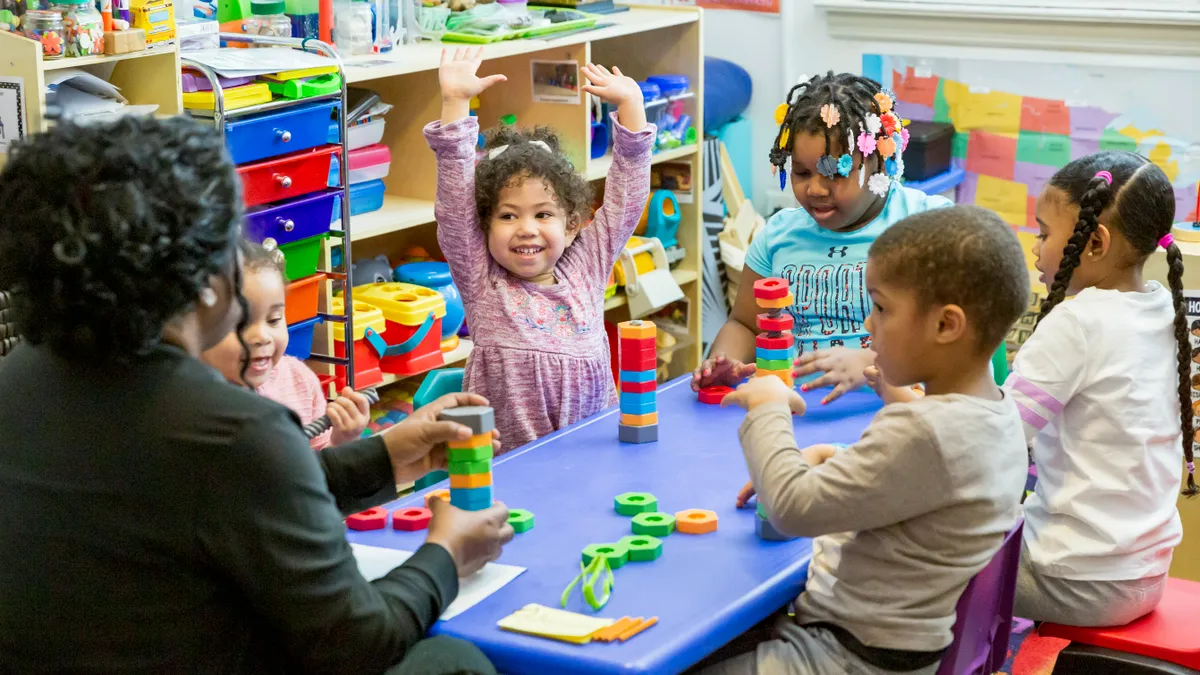Dive Brief:
- Enrollment of young children with disabilities in early intervention and special education services dropped significantly during the COVID-19 pandemic, according to a report released Wednesday by the National Institute for Early Education Research at the Rutgers Graduate School of Education.
- Between fall 2019 and fall 2020, the number of children receiving early intervention fell by about 63,000, and there were 77,000 fewer children in early childhood special education. These national figures represent a year-over-year decrease of 15% and 16%, respectively.
- The research also found that young children with disabilities who are Black, Latino/Hispanic and Asian, as well as those who live in lower-income states, are less likely to receive early intervention and early childhood special education services.
Dive Insight:
Katherine Neas, deputy assistant secretary in the Office of Special Education and Rehabilitative Services at the U.S. Department of Education, said the early intervention and early childhood special education enrollment dips indicate a likelihood that a greater number of children starting preschool or kindergarten will need specialized services.
"We don't yet know what that is, but I think it's a pretty pragmatic observation that we're going to see kids entering kindergarten with more needs than we would otherwise hope," Neas said during a video press call Tuesday ahead of the report's release.
Like the K-12 system, the early intervention field is facing educator shortages, Neas said. Additionally, early intervention programs encounter challenges with identifying young children in need of services, particularly in lower-income communities.
Neas said the Education Department has been prioritizing supports for states in this area through Q&A documents and efforts to increase the supply of early childhood educators, as well as forthcoming resources to help state leaders understand their roles in the early intervention system.
NIEER said its examination is the first equity-focused report to look state-by-state at the two early childhood programs under the Individuals with Disabilities Education Act, which includes services for children with developmental delays or disabilities who are ages birth through 2 years and children ages 3-5.
The report's conclusion is that access to early intervention and early childhood special education is "highly inequitable."
"The disparities that are documented in this equity audit are not just unfair, they're harmful," said Steven Barnett, founder and senior co-director of NIEER, who spoke during the press call.
For example, nationally 3% of children under 3 years participated in early intervention in fall 2020, but enrollment ranged from 10% in Massachusetts to less than 1% in both Arkansas and Hawaii. For early childhood special education, 5% of children ages 3-4 participated nationally during the same period. Wyoming had the highest participation rate at 14%, and Alabama had the lowest at less than 3%.
Localities with low participation may struggle with fewer available programs and face difficulty accessing healthcare programs that may identify developmental delays, Neas said.
The report offers recommendations to increase access to early intervention and special education services:
- Increased federal funding. In addition, the report calls for a full accounting of all funds that support early intervention and special education services, including parent fees and health insurance reimbursements. That data can help determine the amount needed to provide equitable services.
- A national commission to address inequity. The sharing of information between states could lead to a better understanding of the different approaches among localities and the sharing of promising practices.
- Better data and support for more research. Areas that need further research include characteristics of the children who participate, the quality of services children receive, and inclusion of children in programs with peers who don't qualify for early intervention or special education services.






 Dive Awards
Dive Awards




